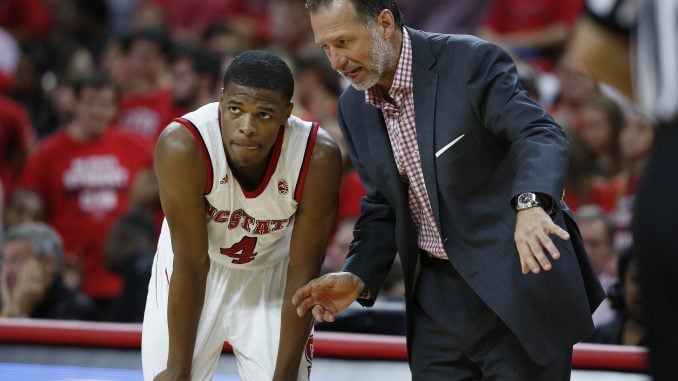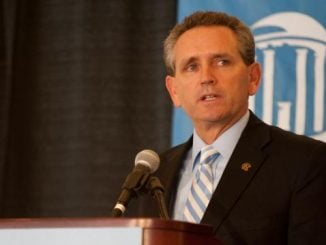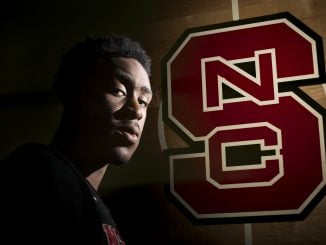
RALEIGH — NC State’s receipt of a formal NCAA Notice of Allegations last week in connection with its recruitment of basketball star Dennis Smith Jr. was headline–worthy news.
But it was anything but a revelation.
School officials have been awaiting the correspondence outlining two major violations and two secondary infractions since last October, when both Smith and former assistant coach Orlando Early were prominently mentioned in a federal trial that led to the conviction of two Adidas operatives and a business agent on charges of wire fraud.
In a statement announcing receipt of the NOA, the university called the document “the expected next step in an NCAA process.” The statement added that State had previously been made aware of the charges and has “voluntarily and fully cooperated, and will continue to fully cooperate with the NCAA throughout this process.”
Under NCAA rules, the university has 90 days to submit a response to the allegations before a hearing date before the Committee on Infractions can be set. The law firm it has hired to represent it in this case — Bond, Schoeneck & King — is the same one that defended rival North Carolina in its recent battle against charges of NCAA violations.
That, however, is one of the only similarities in the cases involving the two Triangle schools.
Unlike the UNC case, in which the Tar Heels successfully challenged the interpretation of an NCAA rule and the organization’s jurisdiction in academic matters, State’s allegations are much more cut-and-dried.
Testifying under oath in the trial of fellow Adidas consultant Merl Code, company executive James Gatto and agent Christian Dawkins, former Adidas employee Thomas “T.J.” Gassnola admitted to funneling money to Smith through Dawkins in 2015 in exchange the five-star recruit’s commitment to play for the Wolfpack.
“I gave Orlando Early $40,000 to give to the family of Dennis Smith,” Gassnola, who agreed to cooperate with federal prosecutors in exchange for pleading guilty.
State’s compliance director, Carrie Doyle, also testified in the trial, saying that she had no knowledge of the payments and that had the school been aware of them, Smith’s scholarship offer would have been rescinded.
That stance appears to be the basis of the Wolfpack’s defense.
“NC State is committed to the highest levels of compliance, honesty and integrity,” chancellor Randy Woodson said in a statement while declining further comment on the matter. “As the university carefully reviews the NCAA’s allegations and thoroughly evaluates the evidence in order to determine our response, we are prepared to be accountable where we believe it is appropriate and to vigorously defend this great university and its Athletics program where we feel it is necessary.”
So where does that leave the Wolfpack?
The two Level 1 violations, Early’s payments to Smith and former head coach Mark Gottfried’s “failure to monitor” his assistant’s actions, carry the potential for severe penalties.
However, State’s exposure in the case could be limited by the fact that both Gottfried and Early have been separated from the university. The wording used in the NOA suggests that the NCAA’s sights are focused more on the coaches involved rather than the university that once employed them.
The other two, lesser violations deal with the improper use of complimentary tickets and parking passes to Wolfpack home basketball and football games.
As ACC commissioner John Swofford pointed out Wednesday at the league’s Football Kickoff media even in Charlotte, it’s difficult to predict how the NCAA will handle this and other cases like it because of the unprecedented circumstances that surround it.
“In terms of speculating, it’s an interesting time on that because it’s the first time that the NCAA will be using a different process, different method, if you will, to evaluate what has happened in court and testimony that has happened in court,” Swofford said. “I think a lot of us in college athletics have our eyes on that and the others that will come after that, just to see how the NCAA approaches it … because there’s no real history there with it at this point in time. So NC State and the other programs that may be implicated will be living that history.”
State has already begun to distance itself from Gottfried and Early, noting in its statement that the former coaches “were well educated about the rules and knew the rules, and that if the allegations are true, those coaches chose to break the rules.”
Gottfried and his staff were fired after the 2016-17 season. No members of the Wolfpack’s current staff were implicated by the NCAA, a fact prominently mentioned by new athletic director Boo Corrigan in a message to his school’s fans posted on Twitter.
“We will make every effort to support Coach (Kevin) Keatts, the student-athletes and staff of our men’s basketball program in achieving their long-term goals,” wrote Corrigan, who took over for the retiring Debbie Yow on May 1. “As a program, we will continue to operate with the highest commitment to compliance, honesty and integrity, and adhering to NCAA rules.”
Keatts referred all questions about the case to Woodson’s statement, but added that he isn’t concerned about the cloud of allegations now hanging over his program becoming a distraction for the upcoming 2019-20 season.
“I will just tell you that our guys are locked in,” he said. “They understand our program right now and what we need to do.”
Smith was one of the nation’s top recruits in the Class of 2016 and his commitment was seen as a major victory for Gottfried in his attempt to return the Wolfpack to national prominence. But things didn’t exactly go as planned.
Although the Fayetteville native averaged 18.1 points per game and was named the ACC’s Rookie of the Year, State went just 15-17 (4-14 in conference play) in Smith’s only college season. He was taken by the Dallas Mavericks with the ninth overall pick in the first round of the 2017 NBA draft.
Smith was one of six college players named by federal prosecutors in the case against Gatto, Code and Dawkins. At least five other Adidas-sponsored programs implicated in the federal case — including traditional powers Kansas and Arizona — are also expected to face NCAA charges.


